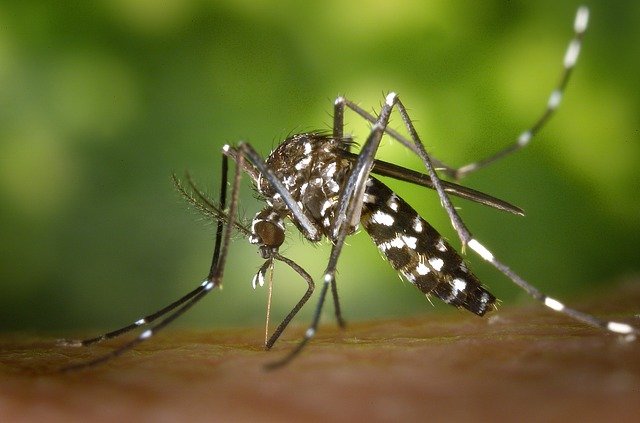Junk science makes my blood boil and feeds mosquitoes
I've posted on several junk-science topics before - astrology, and homeopathy among them. Then today I came across a crowdfunded campaign on Indiegogo for Bandito, a wrist-worn mosquito repellent band. To cite their marketing blurb:
The Bandito wristband utilizes non-toxic scent in combination with powerful sonic sound to create the ultimate portable shield against mosquitoes

Tiger Mosquito, Mosquito, Asian Tigermücke
However, I bet they didn't expect many people to remember that sonic mosquito repellents don't work. It's kind of like trickle down economics - you keep falling for it, you hope it works because those selling it swear by it, but no one has ever demonstrated it to work.
I quickly found a website that cites a couple of studies:
The American Mosquito Control Association says 10 scientific studies of different ultrasonic mosquito repellent devices conducted since 1998 showed none of them had any effect on mosquito behavior. “The fact is that these devices just do not work – marketing claims to the contrary,” said the AMCA. In addition, a 2010 study by the Cochrane Infectious Diseases Group on the efficacy of ultrasonic mosquito repellent devices to repel malaria-carrying mosquitoes concluded the devices "have no effect on preventing mosquito bites."
Here's an extract for the Cochrane study: http://www.cochrane.org/CD005434/INFECTN_electronic-mosquito-repellents-for-preventing-mosquito-bites-and-malaria-infection
A summary by the Hong Kong consumer council: https://www.consumer.org.hk/ws_en/news/press/20120716-1.html
More searching even turned up an article from 2010 about someone who was able to convince KLM to stop selling an electronic mosquito repellent device from their inflight magazine (apparently they were selling 1000 a month). He gave them a bunch of documentation that demonstrated they don't work including that Cochrane article. He made the point that it was unethical and dangerous to send someone to a malaria-prone country and sell them such a device which could cause them to mistakenly think they are protected from mosquitos. Unfortunately, the link and attachments the author provided for the study no longer work (8 years of web link-rot will do that to you).
However, since they gave a file name and report id I was quickly able to dig up this link to a PDF of it that is still working: http://archive.lstmliverpool.ac.uk/977/1/Electronic_mosquito_repellents.pdf
Digging further I found more info on the AMCA claims. There's a BuzzFeed article Do Sonic Bug Repellents Actually Work? and it cites Dr. Roger Gold, professor of entomology at Texas A&M University who studied the devices and says none of them work. It also cites the AMCA saying:
"At least 10 studies in the past 15 years have unanimously denounced ultrasonic devices as having no repellency value whatsoever."
That comes off their website here: https://www.mosquito.org/page/FAQ#Do%20Ultrasonic%20devices%20work?
Consumer Reports has recently reported on its own testing and they point out that manufacturers have been investigated for false advertising and in 2016 the New York AG sent cease and desist letters to two manufacturers who apparently were exploiting the Zika virus scares to peddle their wares.
In addition to sonic devices CR also singles out the following repellents as ineffective:
- wristbands
- natural solutions
- citronella candles
- clip on fans
They have a buying guide for products they say are worth trying: https://www.consumerreports.org/cro/insect-repellent/buying-guide/index.htm
A while back I worked for a company called GoodGuide (now part of Underwriters Laboratories). Their website collated data about product safety, environmental, and social impact. It never touched on efficacy issues but for me having a site that focused purely on whether a product cites junk science to back it up would be a valuable resource.
Sadly junkguide.com is not an available domain. But something like that might be a good case for a token curated registry. It should also be relatively easy to compile research and studies that refute (or verify) claims that product marketers make. Sure you might quickly get into the tricky zone of statistics and issues like significance, effect size, publication bias, and waiting for meta-studies of studies. For me, while it may be hard to prove a negative, the complete absence of reputable studies showing something works is usually a smoking gun for any technology and puts its claims firmly into the tiger repellent zone.
That's some solid debunking. It always makes my blood boil when people try to sell junk science products with dubious health benefits. You can't get much lower than that.
Keep fighting the good fight.
Debunking Kickstarter with a lot of references - that's what I like!
This is a great area to dig into. So much of people's money is wasted on so many different kickstarters. Great niche!
I've been writing a series on Chinese Pseudoscience for some time now you might be interested in (though they go back maybe over 6 months or more for the real juicy stuff)
Excellent, very important, and well researched article. This is the type of content i would like to see on top of the trending page.
I can imagine people buying junk products just to stop getting attacked by mosquitoes, those insects are a pain!
And it is good to expose products that cannot do what they are meant to do, those products are a scam.
Hi @o1o1o1o!
Your post was upvoted by utopian.io in cooperation with steemstem - supporting knowledge, innovation and technological advancement on the Steem Blockchain.
Contribute to Open Source with utopian.io
Learn how to contribute on our website and join the new open source economy.
Want to chat? Join the Utopian Community on Discord https://discord.gg/h52nFrV
Thanks for the feedback guys, glad I bothered to do it.